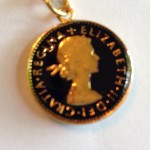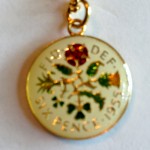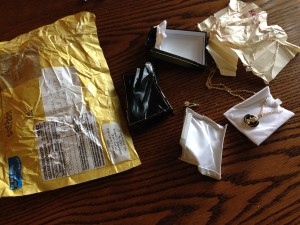The title of this post is a phrase first attributed to Adam Smith in his economics book, The Wealth of Nations. The phrase was repeated in a derisive way by Napoleon to describe the United Kingdom: L’Angleterre est une nation de boutiquiers. Of course, Napoleon said he simply meant that the UK was a nation of commerce, the power that ran the Empire.
Question: Why is she starting a post about England and Napoleon and shopkeepers?
Answer: This week, I—the mystery writer—had a mystery of my own to solve, a mystery which I have not been able to solve. Maybe you can.
So, here’s the story…  In September, 2013, I was on a tour of England, Scotland, and Wales, sponsored by Midwest Bank in our town. During our drive through Cumbria in the Lake District, we stopped at a shop called Keeps in the small town of Grasmere. The shop was very busy since two tour buses were there together, and so it was hectic buying souvenirs and gifts to bring home. But one of my friends found a necklace we all liked. Unfortunately, it was the last one. Undaunted, the shopkeeper said I could pay him for the necklace, and he would ship it to me. My cynical American brain said, “Oh, you don’t want to do that.” But I loved the necklace, and the shopkeeper seemed like an honest man and very helpful. Just call me gullible.
In September, 2013, I was on a tour of England, Scotland, and Wales, sponsored by Midwest Bank in our town. During our drive through Cumbria in the Lake District, we stopped at a shop called Keeps in the small town of Grasmere. The shop was very busy since two tour buses were there together, and so it was hectic buying souvenirs and gifts to bring home. But one of my friends found a necklace we all liked. Unfortunately, it was the last one. Undaunted, the shopkeeper said I could pay him for the necklace, and he would ship it to me. My cynical American brain said, “Oh, you don’t want to do that.” But I loved the necklace, and the shopkeeper seemed like an honest man and very helpful. Just call me gullible.
Here is where I should stop and describe this trinket which cost 54£ ($86.48 at the time). It was made of a sixpence, a coin with a long history of good luck and tradition. On one side it has a black background with the cameo of Queen Elizabeth II, a woman I watched being crowned on television back in 1952 when I was six. The sixpence (six pennies) was legal tender in the UK until June 30, 1980. On the back side are the symbols of the countries of the UK: a thistle for Scotland, a garland with a rose for England, a shamrock for Northern Ireland, and a leek for Wales (a daffodil in Wales is known as “Peter’s leek.”) Also on the back is FI DEF which is Latin (fidei desfensor) for Defender of the Faith.
On the back side are the symbols of the countries of the UK: a thistle for Scotland, a garland with a rose for England, a shamrock for Northern Ireland, and a leek for Wales (a daffodil in Wales is known as “Peter’s leek.”) Also on the back is FI DEF which is Latin (fidei desfensor) for Defender of the Faith. A sixpence is heavy on traditions, especially wedding superstitions. It used to be lucky to find a sixpence in the Christmas pudding if you were a little kid. A silver sixpence was put in a bride’s shoe by her father, wishing her prosperity, love, and happiness. The aircrews of the Royal Air Force sewed a sixpence behind their wings or brevets, a custom for luck beginning in WWII. So the sixpence has quite a history, and since I love history, it was the perfect necklace for me.
A sixpence is heavy on traditions, especially wedding superstitions. It used to be lucky to find a sixpence in the Christmas pudding if you were a little kid. A silver sixpence was put in a bride’s shoe by her father, wishing her prosperity, love, and happiness. The aircrews of the Royal Air Force sewed a sixpence behind their wings or brevets, a custom for luck beginning in WWII. So the sixpence has quite a history, and since I love history, it was the perfect necklace for me.
The long and short of it: I paid for the necklace, signed a mailing label with my address, and went on my way, figuring I would see the necklace in a couple of weeks.
I waited, and waited, and waited. It never came. I was quite upset to think that I had been taken advantage of, and I was just as naïve and trusting as my protagonist in my Endurance mysteries, Grace Kimball. I wrote it off as a lesson learned and felt sure I would never see my necklace.
Here is where the mystery comes in. Yesterday, my long-awaited necklace came in the mail. It looked like it had been through hell . The mailing label said September 16, 2013. The mailing pouch was totally crushed, and when I opened it, the box that contained the necklace was twisted into four parts and a hinge, all lying in the pouch. The paper saying “With Compliments,” was ripped into several pieces.
. The mailing label said September 16, 2013. The mailing pouch was totally crushed, and when I opened it, the box that contained the necklace was twisted into four parts and a hinge, all lying in the pouch. The paper saying “With Compliments,” was ripped into several pieces.
But my necklace came through unscathed—a truly lucky sixpence. Ten months later.
Where was the necklace all this time? Had it been caught in some demonic machine owned by the US Postal Service? The label was perfectly readable, so if someone found it they were able to get it to me. I spoke to a supervisor at our local post office, and she noted the lack of bar code on the package. Now, the USPO bar codes everything, but last September that was not the case. She felt a package this small would not have been put through a machine. In all likelihood, it was left in someone’s mail pouch, recently found, and sent on its way. It could have been in the UK or it could have been in the USA. Because the box is all twisted, it might have been in a very warm place at some point, explaining its condition.
A mystery for the mystery writer—and a piece of truth: that phrase should have read, “A nation of honest shopkeepers,” and I am so grateful.

What a great story…told particularly well. I love your new website. I’m so impressed that you put it together yourself!
Thanks so much, Terry. And I love my new website too, but I’m only the administrator. Tech Tools, LLC actually built it, and they did a wonderful job of collaboration.
It was delivered to a business address just as they were going bankrupt. The property was tied up in court for months. When it was finally settled, the package was discovered and sent on.
OR,
It was delivered to the home of someone who had just been murdered. After the scene was processed, it was hard to find any relatives (or the only relative was convicted of the murder). Somehow, things just got settled, the house went on the market, and you got your six pence.
Oh, what absolutely fantastic ideas. I need to tuck those away for a few books from now. I actually thought that a postal worker was being investigated over a number of months when some missing mail resulted in white collar crime. Once they arrested the postal worker and his partners in crime, all the obscure, meaningless packages in the 300 bags they found in his garage were released for delivery. The huge influx of packages put the US Postal Service back in the black, saving it for at least a few months, and my necklace was delivered. Hurrah.
I think I like your second one best!
Thanks.
Glad you liked them! Let me know if you use one–that would be a kick.
Not so improbable. In our area (just north of Boston) postal workers have been investigated and found to have thousands of pieces of stolen mail in their homes. — at least twice in the past year.
Hmmm. So it sounds like my theory may be correct. Thank you, Claire.